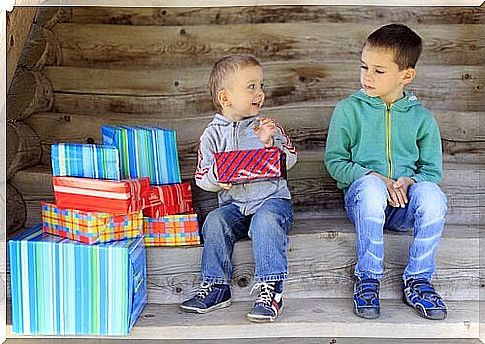Sibling Rivalry

Sibling rivalry is relatively common and normal in children. When a little brother or sister comes along, the firstborn is suddenly no longer the ruler of the house. Now he must share the throne with someone else. And that person seems to get more attention, admiring glances and smiles. Someone he compares himself to.
When a child loses that coveted position where he felt so safe and loved, it scares him. The child is afraid of losing his privileged place. The place where everyone noticed, protected and gave him love. That safe love begins to feel threatened.
After being dethroned, the child begins to think that he is no longer important to his parents. He would prefer to get as much attention as his new brother or sister. This is the beginning of an endless battle for attention.
When the birth of a brother or sister is the end of the world
When a younger sibling is born, the firstborn child begins to feel frustrated and powerless. Fearful, catastrophic thoughts begin to run through his head. He begins to believe that he no longer deserves the love he once received.
Now it feels like he has to fight for that love. He has to do something to get back to that level of pampering and attention that he previously received without having to put in the effort.

Normally, this jealousy between siblings gradually disappears as they get older. But it becomes a problem when the jealousy, which makes sense to some extent, doesn’t go away and instead just gets worse.
There are several variables that can play a role here. In fact, some parents end up giving the jealous child more attention. But it’s still not enough for him. He gets used to getting his way and receiving certain privileges that he wouldn’t have received otherwise.
It is important to understand that every case is different. Some children are naturally more sensitive to jealousy. Some children only throw tantrums when a new brother or sister comes along. For some children, the birth of a sibling occurs in the same way as an emotional disorder in a parent. Every family and every situation is unique.
Understanding the origins of sibling rivalry
Since each case is unique, the origin of the rivalry will also vary. It may have to do with the personality of the child, or with the affective style of the parents. It can also be a result of the emotional state of the family at the time the baby arrives.
Once the parents understand why their firstborn child is so upset, they can respond more effectively. The child needs empathy. He has his own emotions and deserves as much respect as anyone, no matter how young he is. But parents also cannot allow those emotions to cause more distress and chaos in the family.
The child should be punished for his outbursts of anger towards his younger brother or sister. You can do this by giving him less attention or by only giving attention and approval for good behavior.
It is important to recognize, appreciate and reinforce anything he does that demonstrates cooperation and self-confidence. Because this is essentially what he’s asking for. Even though he may not say this out loud. The child wants to feel safe and have confidence in himself and his environment.
Create an emotionally stable environment
Unstable, constantly changing environments create chaos in a child’s emotional development. Therefore, parents should do their best to create a healthy environment. An environment where the child can feel safe about how loved they are. Children often learn through imitation.

That’s why it’s so important to teach them values that they can apply to their interpersonal interactions. Values such as solidarity and being happy for other people. Rather than viewing their peers’ performance with anger and envy, this will help them see that it doesn’t affect their own safety. As a result, their worldview will shift and become healthier. In addition, there will be less rivalry between them and their siblings.
It will be difficult for the child to be happy for his sibling if his parents ignore his achievements. Instead, he will constantly compare himself to his “successor.” Children feel safer in an environment where their positive qualities are valued, rather than an environment where their mistakes are constantly emphasized. Parents should praise the healthy behavior of their children and try to extinguish maladaptive behavior that can lead to disorders.









